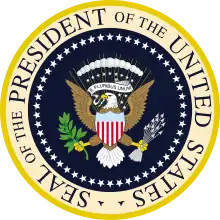Second impeachment trial of Donald Trump
The second impeachment trial of Donald Trump, the 45th president of the United States, is scheduled to begin on February 9, 2021.[1] Trump was impeached for the second time by the House of Representatives on January 13, 2021. The House adopted one article of impeachment against Trump: incitement of insurrection. He is the only U.S. president or other federal official to be impeached twice.[2] The article of impeachment addressed Trump's attempts to overturn the 2020 presidential election results (including his false claims of election fraud and his efforts to pressure election officials in Georgia) and stated that Trump incited the storming of the Capitol in Washington, D.C., while the Congress was convened to count the electoral votes and thus formalize the victory of Joe Biden.[3]
| Second impeachment trial of Donald Trump | |
|---|---|
| Accused | Donald Trump, President of the United States |
| Proponents | |
| Date | To begin February 9, 2021 |
| Charges | |
| Cause | Allegations that Trump pressured Georgia Secretary of State Brad Raffensperger to interfere in the 2020 presidential election on his behalf and incited a deadly riot that led to the storming of the United States Capitol. |
Trump was impeached a week before his presidential term came to an end on January 20, 2021, and he is to be tried after he has left office. There has been debate about whether a president can be impeached and tried when he is no longer in office. Although he cannot be removed from office – the usual goal of impeachment – the possibility remains of permanently restricting a convicted former president from ever holding public office. The Constitution does not state whether a Senate impeachment trial may be held for persons who no longer hold public office, but there is precedent that allows for an impeachment trial: in 1876, Secretary of War William W. Belknap resigned from office after he was implicated in the trader post scandal but before he was impeached; he was nonetheless impeached by the House and tried by the Senate (Belknap was acquitted, with a majority but not the required two-thirds voting for conviction).[4][5]
Trump was first impeached by the House of Representatives on December 18, 2019, on charges of abuse of power and obstruction of Congress in connection with the Trump–Ukraine scandal; he was acquitted on both counts by the U.S. Senate on February 5, 2020.[6] The charges alleged that Trump unlawfully sought to illegally coerce Ukraine and other foreign countries into providing damaging narratives about Trump's political rival Biden, then a candidate for the Democratic presidential nomination, as well as information relating to Russian interference in the 2016 U.S. elections.[7][8]
With party control of the chamber evenly split, 17 Republican senators would need to vote to secure the required two-thirds majority for conviction, assuming that all Democratic senators and the two independents caucusing with the Democrats vote to convict.[9][10]
Background
Under the U.S. Constitution, the House has the sole power of impeachment (Article I, Section 2, Clause 5), and after that action has been taken, the Senate has "the sole Power to try all Impeachments" (Article I, Section 3, Clause 6). Trump is the third U.S. president to face a Senate impeachment trial, after Andrew Johnson and Bill Clinton.[11] Trump is the only federal official to be impeached twice.[12]
The Senate impeachment trial procedures are set forth under the impeachment rules adopted in 1986,[13][14] although specific rules are adopted for each trial, with the Senate majority leader exercising considerable power in setting trial procedure.[14]
House impeachment
| Wikisource has original text related to this article: |
On January 11, 2021, U.S. Representatives David Cicilline, along with Jamie Raskin and Ted Lieu, introduced an article of impeachment against Trump, charging Trump with "incitement of insurrection" in urging his supporters to march on the Capitol building. The article stated that Trump had committed high crimes and misdemeanors by making several statements that "encouraged–and foreseeably resulted in–lawless action" that interfered with Congress' constitutional duty to certify the election and stated that Trump "threatened the integrity of the democratic system, interfered with the peaceful transition of power, and imperiled a coequal branch of Government," doing so in a way that rendered him "a threat to national security, democracy, and the Constitution" if he were allowed to complete his term.[15][16] A total of 218 of the 222 House Democrats co-sponsored the article of impeachment, assuring its passage.[17]
The House passed the article of impeachment on January 13, 2021, by a 232–197 vote. All 222 Democrats voted to impeach, joined by 10 Republicans (including House Republican Conference chairwoman Liz Cheney). Four Republicans did not vote, and the other 197 Republicans voted no.[18][19]
Planning for trial and transmission of articles of impeachment
In the days following Trump's second impeachment, Senate Majority Leader Mitch McConnell (Republican of Kentucky) argued that, because the Senate was in pro forma sessions until January 19, it could not take on any business without the unanimous consent of members. According to the Senate rules for impeachment, once articles of impeachment are presented to the Senate, the Senate trial must begin the next day. Had the articles of impeachment been immediately transmitted to the Senate, Trump's trial thus would have begun on Inauguration Day, after Biden's inauguration.[20][21]
Senate Minority Leader Chuck Schumer (Democrat of New York) called on McConnell to bring the Senate back into session immediately after the House transmits the article of impeachment, and also to advance the confirmation process for Biden's Cabinet nominees so that the incoming administration's team is in place on day one.[22] Some, including House Majority Whip Jim Clyburn (Democrat of South Carolina), initially suggested that the House might transmit the article of impeachment to the Senate at a later date (possibly after Biden's first 100 days as president), giving time for the Senate to consider Biden's legislative program and to confirm Biden's cabinet nominees.[21][23][24] However, House Democrats have opposed a delay, stating that Trump remains a danger while he is in office, and House Majority Leader Steny Hoyer (Democrat of Maryland) said on January 14 that the article of impeachment would be transmitted to the Senate without delay.[23]
After the House impeached Trump, President-elect Biden stated, "I hope that the Senate leadership will find a way to deal with their constitutional responsibilities on impeachment while also working on the other urgent business of this nation."[23] Biden said his priority is enacting a new stimulus bill and rebuilding the economy.[25] He discussed with McConnell the possibility of "bifurcating" the Senate calendar, allowing the trial to proceed while also allowing other business (such as nominations and legislation) to move forward without delay.[23] Under this plan, the Senate could split its days between the trial and other business, rather than having all its time consumed by the trial.[25][26] Former Senate Parliamentarian Alan Frumin said that Senate rules would permit such a course.[23] McConnell told Biden that he would consult with the Senate parliamentarian on such a parallel-track system.[27] Schumer, who would replace McConnell as Senate majority leader, said that a Senate trial could begin immediately.[23]
Law professor Ronald Krotoszynski has written that the Senate could speed up impeachment proceedings (completing the process in a few days, rather than a few weeks) through a process akin to civil summary judgment. This would be permissible under the Constitution, which specifies that the Senate must "try" articles of impeachment and vote to convict (remove) by a two-thirds majority, but allows the Senate to set its own trial rules or procedures on the Senate, as reaffirmed by the U.S. Supreme Court in Nixon v. United States (1993).[28]
On January 22, 2021, it was announced that House Speaker Nancy Pelosi would transfer the articles of impeachment to the Senate on January 25 with the Senate trial expected to be held during the week of February 8.[1]
Impeachment trial of a former president
A Congressional Research Service report concluded "that while the matter is open to debate, the weight of scholarly authority agrees that former officials may be impeached and tried."[29] Ahead of the trial, 150 legal scholars from across the political spectrum published a letter affirming "that the Constitution permits the impeachment, conviction, and disqualification of former officers, including presidents."[30] Law professors Laurence H. Tribe and Stephen I. Vladeck argue that because removal from office is only one of the two possible consequences of a conviction (the other being disqualification for holding public office), the purpose of the trial is not nullified if the impeached person no longer holds public office.[31][32] Gregg Nunziata, a former Republican lawyer for the Senate Judiciary Committee, similarly noted that because impeachment power includes the power to disqualify the person from federal office for life, allowing officeholders to evade this by simply resigning would render "this important punishment ... a nullity."[33] Cardozo School of Law constitutional law professor Kate Shaw argues that "Drafting history, impeachment practice, and basic constitutional design all point clearly in favor of the constitutionality of trying an ex-president."[33] Legal scholar Brian C. Kalt, who has published research about late impeachments, states that "In multiple cases, the House and Senate have proceeded as though they can impeach and try people who have already left office, and in one case the Senate took a specific vote to that effect."[33]
There is precedent for impeaching and trying a federal official who already left office ("late impeachment").[33] In 1797, the House impeached Senator William Blount for conspiracy. The Senate tried him, even though the Senate had already expelled Blount.[33] Secretary of War William W. Belknap resigned hours before the House of Representatives voted for his impeachment with charges relating to his role in the 1876 trader post scandal, and the Senate proceeded to hold the trial, ruling by a vote of 37–29 that it did have jurisdiction after a challenge by Belknap's attorneys.[4][5][34]
Most Republicans in the Senate have argued that the Senate lacks the constitutional authority to conduct an impeachment trial of a former president.[29] This argument has also been made by former federal appellate judge J. Michael Luttig,[35] as well as Trump's former lawyer at his impeachment trial, Harvard Law School professor emeritus Alan Dershowitz,[36] and law professor Jonathan Turley, who testified in Trump's favor at his first impeachment trial.[29]
Officers of the trial
Presiding officer
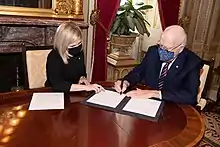
Patrick Leahy, president pro tempore of the Senate, is presiding over the trial,[37][38] in place of Vice President Kamala Harris, the ex officio president of the Senate, who may nonetheless involve herself if any tie-breaking votes need to be cast.[39] Senate Majority Leader Chuck Schumer said that Chief Justice John Roberts declined to preside over the trial.[40]
Prior to the selection of Leahy as presiding officer, there was debate as to who constitutionally should hold that role. Article I, Section 3, Clause 6 of the U.S. Constitution states that the Senate has the sole power to try impeachments and that "When the President of the United States is tried the Chief Justice shall preside."[41][42] Various commentators questioned whether the chief justice must preside over the trial of former presidents.[41][43] Princeton University political scientist Keith Whittington noted that the issue is "unsettled, completely without precedent, and unspecific in existing Senate rules and precedents."[43] The University of North Carolina law professor Michael Gerhardt, an expert on impeachment, stated that he believed that, if the impeachment trial began after Trump leaves office, Harris, as opposed to Roberts, would preside, as Trump would no longer be president.[41] Conversely, University of Texas law professor Steve Vladeck said that "the question should be whether the impeached officer was President at the time of impeachment" and thus Roberts should preside over the trial of Trump even after he leaves office.[41] Vladeck pointed out that "if Trump resigned (or his term ended) mid-trial, it would be more than a little odd for the Chief Justice to give way to the Vice President.[43] Georgia State University law professor Neil Kinkopf's view is that "a trial of a President (even a former President) is a momentous event and having the Chief Justice preside seems more congruent with, or more fitting of, the occasion."[43]
House managers
On January 12, the day before the House debated the article of impeachment, Pelosi named nine Democratic representatives to be managers in a Senate conviction trial: Jamie Raskin (lead manager), Diana DeGette, David Cicilline, Joaquin Castro, Eric Swalwell, Ted Lieu, Joe Neguse, Madeleine Dean, and Stacey Plaskett.[44] By then, 218 members of the 222-member House Democratic caucus had signed on as sponsors of the article, assuring its passage.
The managers were chosen for their expertise in constitutional law, civil rights, and criminal justice. Raskin is a former constitutional law professor at American University. Lieu is a former military prosecutor in the United States Air Force. Cicilline is a former public defender. Swalwell was a former prosecutor in California. DeGette is a former civil rights attorney. Castro, Neguse, Dean and Plaskett are all lawyers in private practice.[45]
| House managers | ||||
|---|---|---|---|---|
| Lead manager Jamie Raskin (Maryland) |
Diana DeGette (Colorado) |
David Cicilline (Rhode Island) |
Joaquin Castro (Texas) |
Eric Swalwell (California) |
 |
 |
.jpg.webp) |
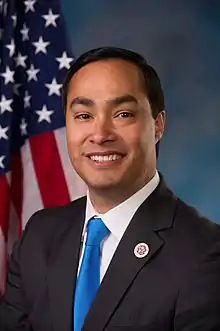 |
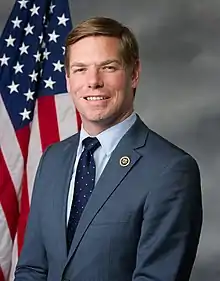 |
| Ted Lieu (California) |
Joe Neguse (Colorado) |
Madeleine Dean (Pennsylvania) |
Stacey Plaskett (U.S. Virgin Islands) |
|
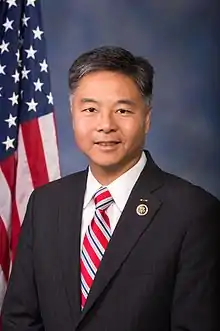 |
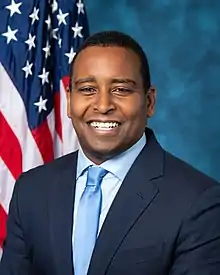 |
 |
.jpg.webp) |
|
Trump defense team
It had been unclear who would be on his legal team, as numerous prominent law firms have refused to represent him. The Lincoln Project has publicly pressed law firms not to do so.[36] Law & Crime reported that "essentially all respectable law firms and attorneys" were distancing themselves from him.[46]
Rudy Giuliani, as Trump's personal lawyer, was left out of early conversations about the upcoming defense, and Trump ordered his aides to stop paying Giuliani.[47][48][49] On January 18, one day after meeting with Trump, Giuliani said he would not represent Trump at the Senate impeachment trial, stating: "Because I gave an earlier speech [at the rally], I am a witness and therefore unable to participate in court or in the Senate chamber."[50] Similarly, John Eastman, who joined Giuliani on stage at the January 6 rally, was initially considered for a role on Trump's defense team, but he withdrew because his role at the rally made him a witness.[51][52] Pat Cipollone, Alan Dershowitz, and Jay Sekulow, who, as Trump's White House Counsel and personal lawyers, respectively, helped lead Trump's defense effort during his first impeachment over Ukraine, will not represent Trump at this second impeachment trial.[53] Other lawyers who defended Trump during his first impeachment trial, including former Florida Attorney General Pam Bondi, Eric Herschmann, Patrick Philbin and Marc Kasowitz, are not interested in joining the defense for the second impeachment trial. Some of them have privately expressed their belief that Trump's actions were indefensible.[36]
Trump and congressional Republicans considered designating two of Trump's most vociferous defenders in Congress—Jim Jordan and Elise Stefanik—to represent him at his impeachment trial. Both voted to reject electoral votes in favor of Biden, even after the president's supporters stormed the Capitol on January 6 during the counting of the electoral votes. Neither is an attorney.[46][lower-alpha 1]
In late January, Trump formed a defense team of five attorneys to be led by Butch Bowers, a South Carolina-based lawyer who helped former South Carolina governor Mark Sanford fight off being removed from office and who also helped former South Carolina Governor Nikki Haley during an ethics investigation.[53][54] Senator Lindsey Graham of South Carolina had arranged Trump's hiring of Bowers.[55] Subsequently, four more lawyers were named to the defense team under Bowers: Deborah Barbier, a Columbia, South Carolina, criminal defense lawyer and former federal prosecutor who has represented high-profile, controversial clients; former acting U.S. Attorney General Johnny Gasser; criminal defense attorney Greg Harris; and Josh Howard of North Carolina.[56][57][58][59] However, the defense attorneys all withdrew on January 30, one week before the trial.[59][60][61] The departures occurred after Trump clashed with his attorneys on strategy (Trump wanted to focus on his false claims that the election was "stolen" from him, in contrast to the lawyers, who insisted on focusing on the legality of convicting a former president),[59][60] and fees (Trump was unhappy with the fees and expenses estimated by the lawyers).[62] None of the lawyers had been paid any advance fees nor had they signed letters of intent.[60]
On February 1, after the collapse of his earlier legal team, Trump announced that David Schoen and Bruce Castor would be his new defense lawyers.[63][64]
Senators' positions
| Party | Support conviction | Open to conviction | Oppose conviction | Unknown |
|---|---|---|---|---|
| Democratic | 39 | 8 | 0 | 1 |
| Republican | 0 | 12 | 37 | 1 |
| Independent | 1 | 1 | 0 | 0 |
| Total | 40 | 21 | 37 | 2 |
Senate Democrats favor the conviction of Trump, stating that the evidence is clear and straightforward. Senator Richard Blumenthal (Democrat of Connecticut) said: "The evidence is Trump’s own words, recorded on video. It's a question of whether Republicans want to step up and face history."[10] Senator Kirsten Gillibrand (Democrat of New York) said, "This is a very simple allegation. It is incitement to insurrection. We could conduct a trial in a concise amount of time because the evidence that's needed is pretty direct."[9] In the run-up to the trial, a number of Republican senators opposed holding a trial.[66][67] Republican Senator Rand Paul of Kentucky continued to make false claims of election fraud.[68][69] Other Senate Republicans, such as Marco Rubio of Florida, contended that a Senate trial would be too divisive and that it would be "arrogant" for the Senate to exercise its power to bar Trump from holding office in the future.[70][71]
Assuming all Democratic senators (and the two independent senators caucusing with the Democrats) vote to convict Trump, 17 Republican senators would need to vote to secure the two-thirds majority for conviction. If Trump is convicted, then the Senate could disqualify him from holding any federal office by a simple majority vote.[9][10] As of February 1, 40 senators (39 Democrats and 1 independent caucusing with the Democrats) supported conviction, 37 senators (all Republican) opposed conviction, 21 senators (8 Democrats, 1 independent caucusing with the Democrats and 12 Republicans) indicated that they were open to conviction, and 2 senators (1 Democrat and 1 Republican) made no comment or ambiguous comments about their stance.[65] Senator Lindsey Graham (Republican of South Carolina) has worked to persuade other Republicans to vote against conviction.[10] Republican Senator Mitch McConnell, the former Senate Majority Leader, reportedly told senators their decision on whether to convict the outgoing president will be a "vote of conscience"[72] and told colleagues he was undecided whether he himself will vote to convict.[73] He later stated on the Senate floor that President Trump "provoked" the mob that stormed the Capitol.[74]
Pre-trial
Opening ceremonies
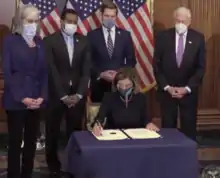
Article I, Section 3, Clause 6 of the U.S. Constitution states that "The Senate shall have the sole Power to try all Impeachments." Per the Senate's impeachment rules adopted in 1986, the submission of the articles to the Senate initiated the trial.[13] Speaker Pelosi signed the article of impeachment on January 13, 2021.[75] The article was formally transmitted to the Senate on January 25, 2021.[76] On January 26, the House impeachment managers, accompanied by the clerk of the House and the acting House sergeant at arms, conducted the ceremonial procession from the House to the Senate (across the National Statuary Hall and the Capitol rotunda) to formally deliver the article of impeachment, triggering the trial.[77][78] Raskin, the lead House impeachment manager, read the article to the Senate.[77]
Senate President pro tempore emeritus Chuck Grassley (Republican of Iowa), swore in the chamber's presiding officer, Senate President pro tempore Patrick Leahy (Democrat of Vermont),[79] who then swore in all senators who will act as jurors. Each senator then signed the oath book. Each is required to take the following oath or make the affirmation:[79][80][81][82]
Oath: I solemnly swear that in all things appertaining to the trial of the impeachment of Donald John Trump, former President of the United States, now pending, I will do impartial justice according to the Constitution and laws: So help me God.
Affirmation: I affirm that in all things appertaining to the trial of the impeachment of Donald John Trump, former President of the United States, now pending, I will do impartial justice according to the Constitution and laws.
The acting Senate sergeant-at-arms, Jennifer Hemmingway, then read aloud the following proclamation to mark the beginning of the proceedings:
Hear ye! Hear ye! Hear ye! All persons are commanded to keep silent, on pain of imprisonment, while the House of Representatives is exhibiting to the Senate of the United States articles of impeachment against Donald John Trump, former President of the United States.
Rand Paul's point of order to dismiss
Republican Senator Rand Paul of Kentucky forced a vote on January 26 on a point of order to dismiss the impeachment charge, claiming that it is unconstitutional to try a past president. The objection was defeated on a 55–45 vote, with all Democrats and five Republicans (Susan Collins of Maine, Lisa Murkowski of Alaska, Mitt Romney of Utah, Ben Sasse of Nebraska, and Pat Toomey of Pennsylvania) voting to set aside the objection.[83][29] The vote was seen as a "test vote" and was viewed as a strong indication that the Senate would not reach the two-thirds majority required to convict Trump.[29][84]
Trial memoranda and responses
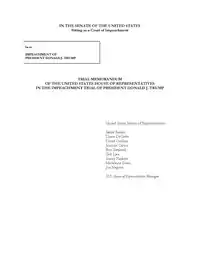
Under an agreement between Schumer and McConnell, the pre-trial briefing schedule was set.[79]
The House of Representatives, through the nine Democratic impeachment managers, filed an 80-page pretrial brief on February 2. The detailed brief stated that Trump was "singularly responsible" for the violent attack on the Capitol on January 6, citing his preceding campaign to undermine democracy and overthrow the election, and argued that acquitting Trump and failing to disqualify him from future office would gravely harm the nation, stating: "President Trump has demonstrated beyond doubt that he will resort to any method to maintain or reassert his grip on power. A president who violently attacks the democratic process has no right to participate in it."[85] The impeachment managers argued that the expiration of Trump's term, and his new status as a private citizen, did not present a bar to Senate trial and conviction, writing: "There is no 'January exception' to impeachment or any other provision of the Constitution. A president must answer comprehensively for his conduct in office from his first day in office through his last.[85] and that it was "unthinkable" that the Framers of the Constitution would have left the country "virtually defenseless against a president's treachery in his final days, allowing him to misuse power, violate his Oath, and incite insurrection against Congress and our electoral institutions simply because he is a lame duck."[86] The House brief stated that "if provoking an insurrectionary riot against a Joint Session of Congress after losing an election is not an impeachable offense, it is hard to imagine what would be."[87]
Trump's lawyers filed a 14-page response to the article of impeachment later the same day.[87] Trump's lawyers did not explicitly embrace Trump's false claims of a "rigged" election,[87] but nevertheless echoed them, asserting that there was "Insufficient evidence exists upon which a reasonable jurist could conclude that the 45th president's statements were accurate or not, and he therefore denies they were false."[86] Trump's lawyers also argued that the impeachment proceeding is legally "void" because Trump is no longer president.[88][89][87] The brief asserted that prior to the January 6 riots, Trump had "exercised his First Amendment right under the Constitution to express his belief that the election results were suspect."[87] The House had predicted that Trump would use the First Amendment for his defense, which they countered in their brief that the First Amendment was not applicable to an impeachment trial, writing: "The First Amendment protects private citizens from the government; it does not protect government officials from accountability for their own abuses in office."[88] Quoting the standard established in Brandenburg v. Ohio (1969), a landmark decision of the U.S. Supreme Court interpreting the First Amendment,[90] the House added that "speech is not protected where it is 'directed to inciting or producing imminent lawless action and is likely to incite or produce such action."[88] Nearly 150 leading First Amendment lawyers and constitutional scholars from across the political spectrum found Trump's First Amendment assertion "legally frivolous" and not a viable defense against conviction, according to The New York Times.[91]
Trump's pre-trial brief is due on February 8 and the House's pre-trial rebuttal is due the next day (February 9).[79]
Trump declines invitation to testify
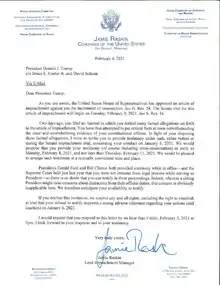
In a letter to Trump attorneys on February 4, lead impeachment manager Jamie Raskin invited Trump to testify (and be subject to cross-examination) before or during the impeachment trial; the House impeachment managers argued that his testimony was needed after he disputed the House's allegations that he incited the insurrection at the Capitol.[92] The letter stated that Trump's refusal to testify would support "a strong adverse inference" against Trump.[92] The House's letter noted that there was no barrier to a former president giving testimony (and noted that Presidents Gerald Ford and Bill Clinton had testified in office, and the Supreme Court held in Trump v. Vance (2020) that Trump was not immune from legal process while serving as president).[93]
Trump's lawyers Castor and Schoen responded to Raskin the same day in a terse letter declining the invitation.[92] In their response, they called the House's request for Trump's testimony "a public relations stunt"; rejected the implication of adverse inference for refusing the testify; said that the House "cannot prove" its allegations; called the impeachment trial a "unconstitutional proceeding"; and stated that it is too serious "to try and play these games".[1][94][95]
The House impeachment managers signaled that they would not subpoena Trump's testimony, stating that there is ample other evidence (including video evidence) that supports his guilt.[96] Raskin stated that Trump's "immediate refusal to testify speaks volumes and plainly establishes an adverse inference supporting his guilt."[96]
Opening statements
Opening arguments for the trial[97] are set to begin February 9.[85]
Prosecution
In preparation for the trial, House Democrats built a detailed case against Trump, emphasizing what Trump knew in advance of the attack on the Capitol on January 6 and the effect of Trump's words and actions on his rioting supporters, with the goal of showing that Trump "summoned the mob, assembled the mob, and lit the flame of this attack."[98] House impeachment managers and the staff, aided by the law firm Debevoise & Plimpton, have compiled audio and video footage of Trump's rally and the ensuing attack on the Capitol, as well as details about the injuries sustained by police.[98]
Defense
Trump has announced that he won't testify for the impeachment trial.[99]
Public opinion
A Reuters/Ipsos poll released on January 22 found that 51% of Americans favored conviction of Trump in the Senate, 37% opposed, and 12% were unsure. 55% of Americans supported the Senate disqualifying Trump from holding federal office in the future; 34% opposed this step, and 11% said they were unsure.[100]
A Monmouth University poll released on January 25 found that 52% of Americans favored conviction of Trump in the Senate, while 44% opposed; 57% supported the Senate disqualifying Trump from holding federal office in the future.[101][102]
See also
Notes
- Jordan graduated from Ohio's Capital University Law School in 2001, but has never been admitted to the bar; Stefanik has no formal legal training.[46]
References
- Walters, Joanna (February 4, 2021). "Donald Trump will refuse to testify at Senate impeachment trial, lawyers say". The Guardian. ISSN 0261-3077.
- Fandos, Nicholas (January 8, 2021). "How to Impeach a President in 12 Days: Here's What It Would Take". New York Times.
- Nicholas Fandos (January 13, 2021). "Trump Impeached for Inciting Insurrection". New York Times.
- Pete Williams (January 8, 2021). "Can Trump be tried in the Senate on impeachment charges even after he leaves office? Some experts say yes". NBC News. Retrieved January 9, 2021.
- "Trump impeached after Capitol riot in historic second charge". Associated Press. January 14, 2021.
While some have questioned impeaching the president so close to the end of his term, there is precedent. In 1876, during the Ulysses Grant administration, War Secretary William Belknap was impeached by the House the day he resigned, and the Senate convened a trial months later. He was acquitted.
- Ewing, Philip (February 5, 2020). "'Not Guilty': Trump Acquitted On 2 Articles Of Impeachment As Historic Trial Closes". NPR. Archived from the original on February 6, 2020.
- Miller, Greg; Jaffe, Greg; Parker, Ashley (October 2, 2019). "Trump involved Pence in efforts to pressure Ukraine's leader, though aides say vice president was unaware of pursuit of dirt on Bidens". The Washington Post. Archived from the original on October 3, 2019. Retrieved October 2, 2019.
- Mazzetti, Mark; Benner, Katie (September 30, 2019). "Trump Pressed Australian Leader to Help Barr Investigate Mueller Inquiry's Origins". The New York Times. Archived from the original on October 3, 2019. Retrieved October 4, 2019.
- Felicia Sonmez and Mike DeBonis, Senate Democrats signal hope for bipartisan Trump impeachment trial, Washington Post (January 14, 2021).
- Nicholas Fandos & Catie Edmondson, Senate Plans Trial for Trump as G.O.P. Weighs Risks of Convicting, New York Times (January 14, 2021).
- Roos, Dave. "What Happens After Impeachment". History. Archived from the original on December 19, 2019. Retrieved December 20, 2019.
- Josh Chafetz (January 14, 2021). "Trump's second impeachment makes constitutional sense. Senate conviction must follow". Think. NBC News.
making Trump the first American federal officeholder of any sort to be impeached twice
- "Rules of Procedure and Practice in the Senate When Sitting on Impeachment Trials" (PDF). U.S. Government Publishing Office. p. 223. Archived (PDF) from the original on December 15, 2019. Retrieved January 3, 2020.
- Erin Blakemore (January 13, 2021). "In a historic first, a U.S. president has been impeached twice. Here's what happens next". National Geographic.
- Moe, Alex; Shabad, Rebecca (January 11, 2021). "'He threatened the integrity of the democratic system': House introduces one article of impeachment against Trump". NBC News. Retrieved January 11, 2021.
- "Read the House article of impeachment against President Trump". Los Angeles Times. January 11, 2021. Retrieved January 11, 2021.
- Cheney, Kyle (January 11, 2021). "House to vote Wednesday as Pelosi gets the votes to impeach Trump". Politico.
- Washington, U.S. Capitol Room H154 (January 13, 2021). "Roll Call 17, Bill Number: H. Res. 24, 117th Congress, 1st Session". Office of the Clerk, U.S. House of Representatives. Retrieved January 13, 2021.
- Staff and agency (January 13, 2021). "The 10 Republicans who voted to impeach Donald Trump". The Guardian.
- Conley-Kendzior, Lisa (January 8, 2021). "McConnell circulates procedures for second Senate impeachment trial of Trump". The Hill. Retrieved January 9, 2021.
- Lisa Mascaro; Mary Clare Jalonick (January 14, 2021). "Trump impeachment trial could begin on Inauguration Day". Associated Press.
- Levine, Marianne (January 12, 2021). "Schumer pledges to confirm Biden's Cabinet, press for more Covid relief amid impeachment". Politico. Retrieved January 12, 2021.
- Janet Hook; Jennifer Haberkorn (January 13, 2021). "House impeaches Trump a second time – with 10 Republicans on board". Los Angeles Times.
- "Clyburn says Trump impeachment trial could be delayed until after Biden's first 100 days". NBC News. Retrieved January 14, 2021.
- Morgan Chalfant (January 11, 2021). "Biden hopes Senate can split time on impeachment, his agenda".
- Seung Min Kim; Annie Linskey; Josh Dawsey (January 11, 2021). "House barrels toward impeachment, and Biden scrambles to ensure it doesn't hamper his agenda". Washington Post. Retrieved January 12, 2021.
- Catie Edmondson, Why Remove Trump Now? A Guide to the Second Impeachment of a President, New York Times (January 14, 2021).
- Ronald Krotoszynski, How the Senate Could Speed Up the Impeachment Trial, Politico Magazine (January 13, 2021).
- Siobhan Hughes & Lindsay Wise, Most Republican Senators Reject Constitutionality of Trump Impeachment, Wall Street Journal (January 26, 2021).
- Natasha Bertrand, Legal scholars, including at Federalist Society, say Trump can be convicted, Politico (January 21, 2021).
- Stephen I. Vladeck, Why Trump Can Be Convicted Even as an Ex-President, New York Times (January 14, 2021).
- Laurence H. Tribe, The Senate can constitutionally hold an impeachment trial after Trump leaves office, Washington Post (January 13, 2021).
- Greg Stohr, Trump Impeachment Trial After Term Ends Is Backed by History, Bloomberg News (January 14, 2021).
- Chuck Todd, Mark Murray, Carrie Dann & Melissa Holzberg, Meet the other American who was impeached and tried after leaving office, NBC News (January 25, 2021).
- J. Michael Luttig, Once Trump leaves office, the Senate can't hold an impeachment trial, Washington Post (January 12, 2021).
- "Trump Struggles to Find Lawyers as Impeachment Trial Nears". Bloomberg.com. January 14, 2021. Retrieved January 14, 2021.
- Alexander Bolton; Jordain Carney (January 25, 2021). "Leahy, not Roberts, to preside over impeachment trial". The Hill. Retrieved January 25, 2021.
- Susan Davis (January 25, 2020). "Sen. Patrick Leahy To Preside Over Trump's Senate Impeachment Trial". NPR.
- Fandos, Nicholas (January 25, 2021). "Senator Patrick Leahy, the longest-serving Democrat, will preside over Trump's impeachment trial". The New York Times. Retrieved January 25, 2021.
- "John Roberts ducks the spotlight by skipping the second Trump impeachment trial". CNN. January 26, 2021. Retrieved January 27, 2021.
- Joan Biskupic. "Analysis: John Roberts can't escape the shadow of Donald Trump". CNN. Retrieved January 14, 2021.
- "U.S. Constitution, Article I, Section 3". United States Senate.
- Unclear who presides at Trump trial if he's out of office, Associated Press (January 14, 2020).
- Marcos, Cristina (January 12, 2021). "Pelosi names 9 impeachment managers". The Hill. Retrieved January 13, 2021.
- Broadwater, Luke; Cochrane, Emily (January 12, 2021). "Pelosi names nine Democrats to lead the impeachment effort". The New York Times.
- Jerry Lambe (January 14, 2021). "With Real Attorneys Steering Clear, Trump May Have to Settle For Rep. Jim Jordan as Impeachment 'Attorney'". Law & Crime. Retrieved January 15, 2021.
- Collins, Kaitlan; Pamela Brown and Jamie Gangel (January 14, 2021). "Trump has told staff not to pay Rudy Giuliani over irritation at being impeached again". CNN. Retrieved January 14, 2021.
- Rucker, Philip; Josh Dawsey and Ashley Parker (January 13, 2021). "Trump is isolated and angry at aides for failing to defend him as he is impeached again". Washington Post. Retrieved January 14, 2021.
- Schmidt, Michael S.; Haberman, Maggie (November 17, 2020). "Giuliani Is Said to Seek $20,000 a Day Payment for Trump Legal Work". The New York Times. ISSN 0362-4331. Retrieved January 14, 2021.
- Jonathan Karl & Marc Nathanson, Giuliani says he won't represent Trump at president's impeachment trial, ABC News (January 18, 2021).
- Freifeld, Karen (January 14, 2021). "Exclusive: Trump considering lawyer who spoke at rally for impeachment defense – sources". Reuters. Retrieved January 14, 2021.
- https://twitter.com/kaitlancollins/status/1352988995047874561
- Monica Alba, Kasie Hunt and Julie Tsirkin, Trump hires defense lawyer for second Senate impeachment trial, NBC News (January 21, 2021).
- Kranish, Michael; Dawsey, Josh. "To fight impeachment, Trump turns to 'Butch' Bowers, a South Carolina lawyer at a small firm who has defended state Republicans". The Washington Post. Retrieved January 23, 2021.
- Maggie Haberman (January 21, 2021). "For the impeachment trial, Trump settles on a South Carolina lawyer arranged through Lindsey Graham". The New York Times.
- Andy Shain (January 25, 2021). "Another Columbia attorney joining Trump's impeachment defense team". Post & Courier.
- John Monk (January 25, 2021). "Columbia attorney Deborah Barbier tapped for Trump's impeachment defense trial team". The State.
- Mintzer, Adam. "4 SC attorneys to lead Trump's impeachment defense4 SC attorneys to lead Trump's impeachment defense". WMBF-TV. Retrieved January 31, 2021.
- Maggie Haberman (January 30, 2021). "Trump Parts Ways With Five Lawyers Handling Impeachment Defense". New York Times.
- Gloria Borger, Kaitlan Collins, Jeff Zeleny and Ashley Semler. "First on CNN: Five of Trump's impeachment defense attorneys leave team less than two weeks before trial". CNN.CS1 maint: uses authors parameter (link)
- Alba, Monica. "Trump appears to be without a legal team as impeachment trial nears". NBC News. Retrieved January 31, 2021.
- Alayna Treene, Scoop: Fees — not just strategy — blew up Trump's legal team, Axios (February 1, 2021).
- Jeremy Roebuck, Andrew Seidman and Laura McCrystal, Pa. Republicans are stumped by Trump's pick of Bruce Castor for his impeachment defense. Others see a 'natural choice.', Philadelphia Inquirer (February 1, 2021).
- Jim Acosta, Kaitlan Collins, Pamela Brown and Katelyn Polantz, Trump names two new lawyers for impeachment trial a day after his defense team collapsed, CNN (February 1, 2021).
- Still, Ashlyn; Rieger, J. M. "Senate impeachment whip count: Where Democrats and Republicans stand". Washington Post. Retrieved January 26, 2021.
- Mary Clare Jalonick & Lisa Mascaro House sending Trump impeachment to Senate, GOP opposes trial, Associated Press (January 25, 2021).
- Allan Smith, 'The trial is stupid': Senate Republicans throw cold water on Trump impeachment, NBC News (January 24, 2021).
- Jack Arnholz, Sen. Rand Paul continues making false claims of 2020 election fraud, ABC News (January 24, 2021).
- Philip Bump, Falsehoods that lead to an insurrection are not simply points of left-right disagreement, Washington Post (January 25, 2021).
- Laura King, GOP senators appear to be divided as House readies impeachment delivery, Los Angeles Times (January 24, 2021).
- Kelly Hooper, Marco Rubio: It's 'arrogant' to impeach Trump, Politico (January 24, 2021).
- Mascaro, Lisa; Jalonick, Mary Clare. "Trump trial pending, McConnell calls it 'vote of conscience'". Associated Press. Retrieved January 17, 2021.
- Clark, Dartunorro; Hunt, Kasie. "McConnell remains undecided on convicting Trump in Senate trial". NBC News. Retrieved January 17, 2021.
- "U.S. Senate Republican leader McConnell says Trump 'provoked' Jan. 6 riot". Reuters. January 20, 2021. Retrieved January 20, 2021.
- Benjamin Din, Pelosi signs article of impeachment, Politico (January 13, 2021).
- Seung Min Kim, Tom Hamburger, Josh Dawsey & Karoun Demirjian, House Democrats plan to focus impeachment trial on how rioters reacted to Trump's remarks, Washington Post (January 25, 2021).
- Dartunorro Clark, House managers deliver impeachment article against Trump, kicking off trial preparations, NBC News (January 26, 2021).
- Dannielle Maguire with wires, A ceremonial procession kicked off Trump's impeachment trial. But that's just the beginning of it, ABC News (Australia) (January 26, 2021).
- Jordain Carney, Senate sworn in as jurors for Trump impeachment trial, The Hill (January 26, 2021).
- Rules of Procedure and Practice in the Senate When Sitting on Impeachment Trials Archived December 15, 2019, at the Wayback Machine (Rules of Procedure and Practice in the Senate When Sitting on Impeachment Trials, gpo.gov, "Revised pursuant to S. Res. 479, 99–2, Aug. 16, 1986")
- Hurd, Hilary; Wittes, Benjamin (December 2, 2019). "Imagining a Senate Trial: Reading the Senate Rules of Impeachment Litigation". Lawfare. Archived from the original on December 17, 2019. Retrieved December 30, 2019.
- Nicholas Fandos, Republicans vote en masse against trying Trump, signaling he is likely to be acquitted of the impeachment charge, New York Times (January 26, 2020).
- Nicholas Fandos, Republicans vote en masse against trying Trump, signaling he is likely to be acquitted of the impeachment charge., New York Times (January 26, 2021).
- Mike DeBonis & Seung Min Kim, Nearly all GOP senators vote against impeachment trial for Trump, signaling likely acquittal, Washington Post (January 26, 2021).
- Nicholas Fandos, House impeachment managers argue that Trump was 'singularly responsible' for the Capitol riot., New York Times (February 2, 2021).
- Andrew Desiderio & Heather Caygle, Trump doubles down on false election claim in impeachment response, Politico (February 2, 2021).
- Amy Gardner, Karoun Demirjian & Colby Itkowitz, Trump's actions described as 'a betrayal of historic proportions' in trial brief filed by House impeachment managers, Washington Post (February 2, 2021).
- Herb, Jeremy; Manu Raju and Lauren Fox (February 2, 2021). "House charges Trump is 'singularly responsible' for inciting insurrection as ex-president's team claims he's protected by 1st Amendment". CNN. Retrieved February 4, 2021.
- "Read Trump's response to the article of impeachment against him". CNN. February 2, 2021. Retrieved February 4, 2021.
- "Read: Democrats' impeachment trial brief". CNN. Retrieved February 5, 2021.
- Fandos, Nicholas (February 5, 2021). "Lawyers Call Trump's First Amendment Defense 'Legally Frivolous'". The New York Times.
- Herb, Jeremy; Raju, Manu (February 4, 2021). "House impeachment managers request former President Donald Trump testify at trial". CNN.
- "READ: Letter from House impeachment managers asking Trump to testify". February 4, 2021.
- "Trump rejects Dems' request to testify at impeachment trial". Associated Press. February 4, 2021.
- Fandos, Nicholas; Schmidt, Michael S.; Haberman, Maggie (February 5, 2021). "Trump Refuses Surprise Call to Testify in His Impeachment Trial". The New York Times. ISSN 0362-4331.
- Manu Raju and Jeremy Herb (February 5, 2021). "Democrats indicate they don't need Trump's testimony to make case at impeachment trial". CNN.
- Meg Kinnard & Eric Tucker, Trial ahead, Trump turns to ethics lawyer for his defense, Associated Press (January 22, 2021).
- Mike DeBonis, Tom Hamburger, Karoun Demirjian & Amy Gardner, House Democrats building elaborate, emotionally charged case against Trump, Washington Post (January 29, 2021).
- "Trump Rejects Dems' Request to Testify at Impeachment Trial". NBC New York. Retrieved February 6, 2021.
- Chris Kahn, [Slim majority of Americans want Senate to convict Trump: Reuters/Ipsos poll], Reuters (January 22, 2021).
- Benjamin Din, Poll: Majority of Americans support Trump impeachment and conviction, Politico (January 25, 2021).
- Summer Lin, Where do Americans stand on convicting Trump of impeachment? Most support in new poll, Charlotte Observer (January 25, 2021).
External links
 The full text of Article of Impeachment against Donald J. Trump (2021) at Wikisource
The full text of Article of Impeachment against Donald J. Trump (2021) at Wikisource- Trial Memorandum of the United States House of Representatives in the Impeachment Trial of President Donald J. Trump (February 2, 2021)
.jpg.webp)
